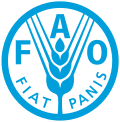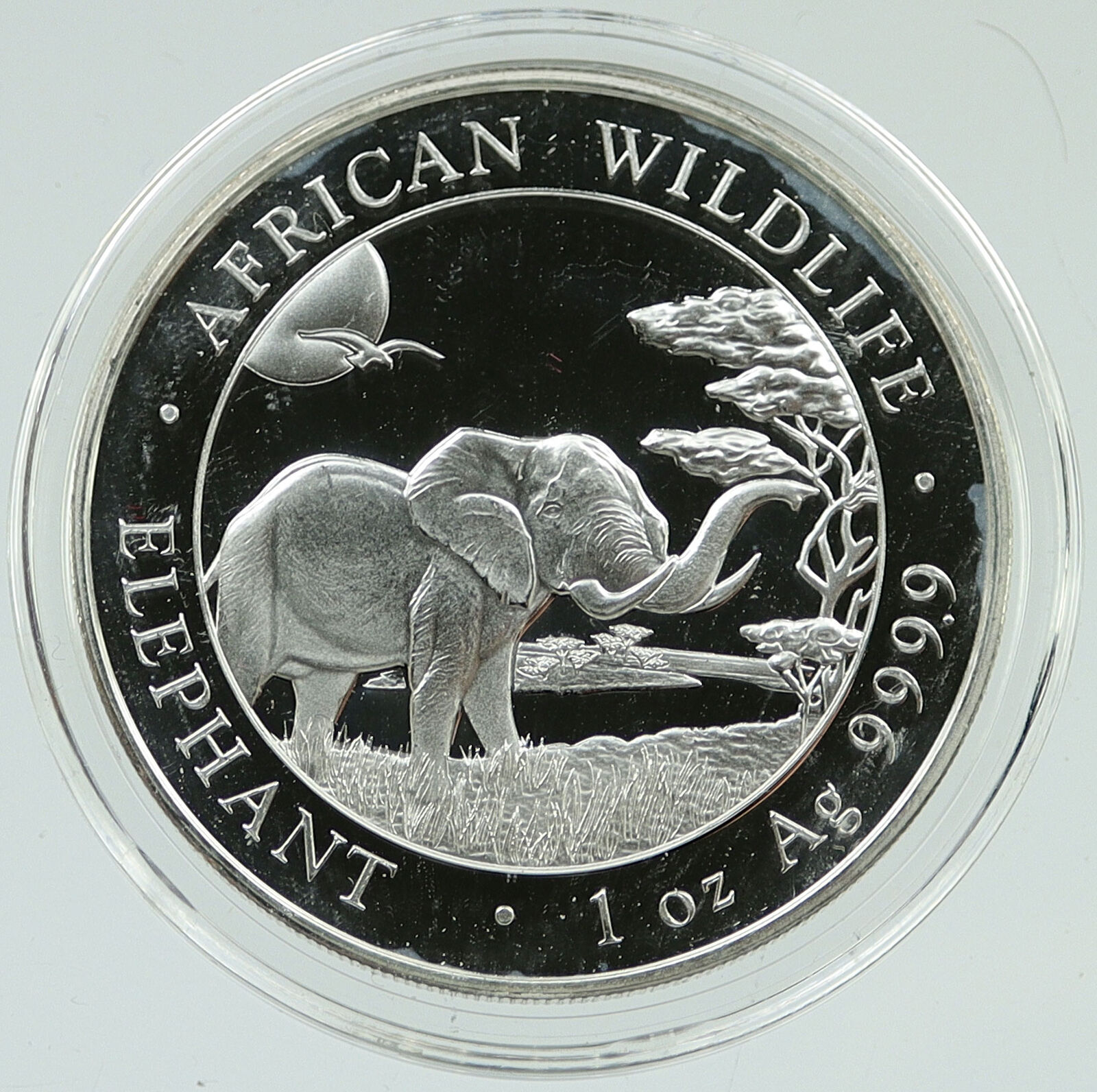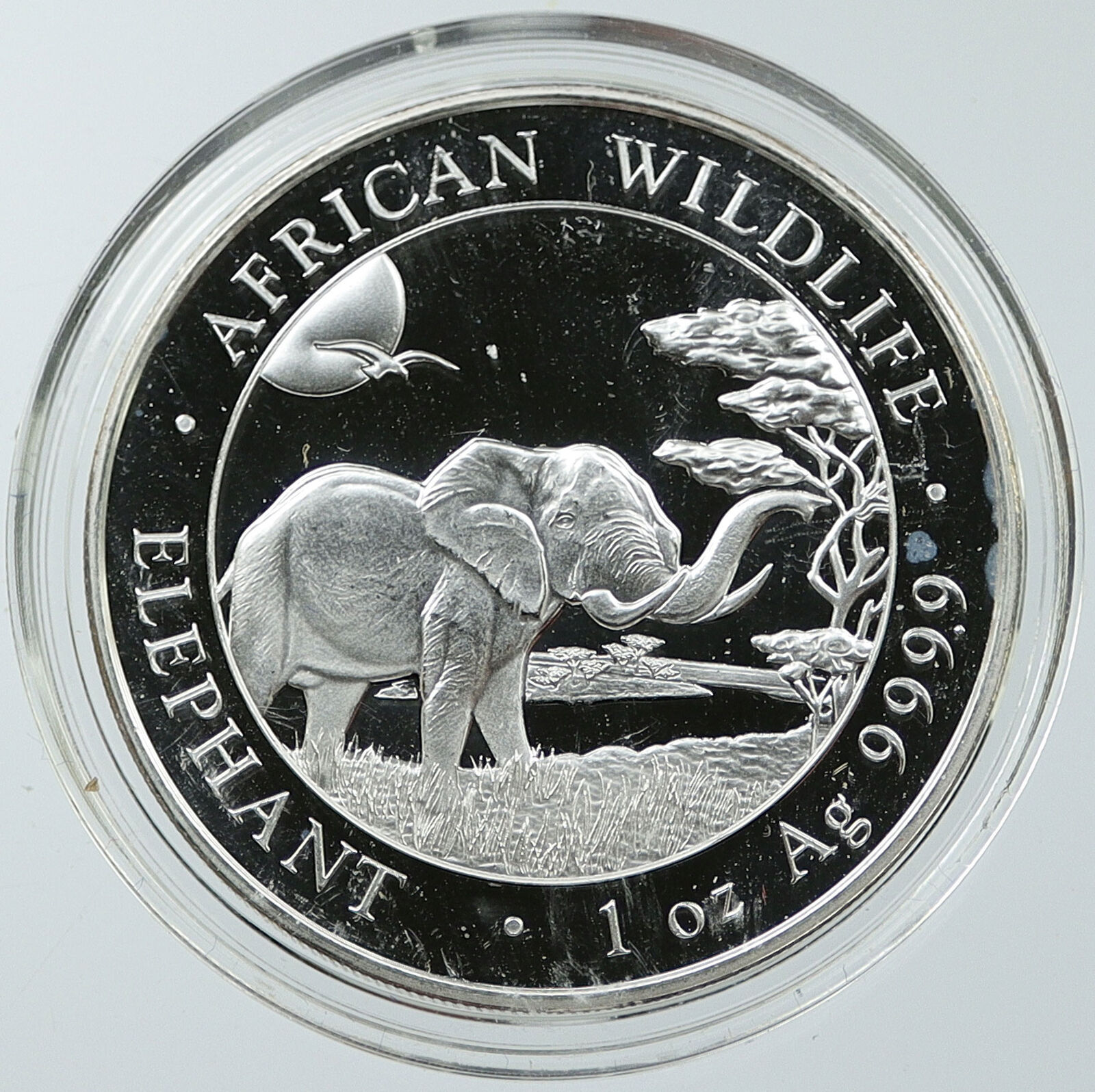|
Somalia – Somali Republic – Commemorative issue – 2nd F.A.O. Conference
1970 Copper-nickel 5 Shillings (5 Shilin) (5 SOS) 38mm (27.85 grams)
Reference: KM# 15, Schön# 15, Y# 10 | Mintage: 100 000
Obverse Crowned arms with supporters Scripts: Arabic, Latin Lettering:
١٩٧٠ – SOMALI DEMOCRATIC REPUBLIC 1970 –
الجمهورية الديمقراطية الصمالية Translation: Somali Democratic Republic
Reverse Cow, goat, sheep and fruit Scripts: Arabic, Latin Lettering:أرفعوا محصولكم الزراعي
5 shillings٥ شلنات
GROW MORE FOOD
Translation:Rise your agricultural production 5 Shilings
You are bidding on the exact item pictured, provided with a Certificate of Authenticity and Lifetime Guarantee of Authenticity.
 The Food and Agriculture Organization of the United Nations (FAO) is a specialized agency of the United Nations that leads international efforts to defeat hunger and improve nutrition and food security. Its Latin motto, fiat panis, translates to “let there be bread”. It was founded on 16 October 1945. The Food and Agriculture Organization of the United Nations (FAO) is a specialized agency of the United Nations that leads international efforts to defeat hunger and improve nutrition and food security. Its Latin motto, fiat panis, translates to “let there be bread”. It was founded on 16 October 1945.
The FAO comprises 195 members, including 194 countries and the European Union. Its headquarters is in Rome, Italy, and it maintains regional and field offices worldwide, operating in over 130 countries. It helps governments and development agencies coordinate their activities to improve and develop agriculture, forestry, fisheries, and land and water resources. It also conducts research, provides technical assistance to projects, operates educational and training programs, and collects agricultural output, production, and development data.
The FAO is governed by a biennial conference representing each member country and the European Union, which elects a 49-member executive council. The Director-General, as of 2019 Qu Dongyu of China, serves as the chief administrative officer. Various committees govern matters such as finance, programs, agriculture, and fisheries.
 The Somali Republic (Somali: Jamhuuriyadda Soomaaliyeed, Italian: Repubblica Somala, Arabic: الجمهورية الصومالية Jumhūriyyat aṣ-Ṣūmāl) was the official name of Somalia after independence on July 1, 1960, following the unification of the Trust Territory of Somaliland (the former Italian Somaliland) and the State of Somaliland (the former British Somaliland). A government was formed by Abdullahi Issa Mohamud and Muhammad Haji Ibrahim Egal and other members of the trusteeship and protectorate administrations, with Haji Bashir Ismail Yusuf as President of the Somali National Assembly and Aden Abdullah Osman Daar as President of the Somali Republic. On 22 July 1960, Daar appointed Abdirashid Ali Shermarke as Prime Minister. On 20 July 1961 and through a popular referendum, the people of Somalia ratified a new constitution, which was first drafted in 1960. The administration lasted until 1969, when the Supreme Revolutionary Council (SRC) seized power in a bloodless putsch and renamed the country the Somali Democratic Republic. The Somali Republic (Somali: Jamhuuriyadda Soomaaliyeed, Italian: Repubblica Somala, Arabic: الجمهورية الصومالية Jumhūriyyat aṣ-Ṣūmāl) was the official name of Somalia after independence on July 1, 1960, following the unification of the Trust Territory of Somaliland (the former Italian Somaliland) and the State of Somaliland (the former British Somaliland). A government was formed by Abdullahi Issa Mohamud and Muhammad Haji Ibrahim Egal and other members of the trusteeship and protectorate administrations, with Haji Bashir Ismail Yusuf as President of the Somali National Assembly and Aden Abdullah Osman Daar as President of the Somali Republic. On 22 July 1960, Daar appointed Abdirashid Ali Shermarke as Prime Minister. On 20 July 1961 and through a popular referendum, the people of Somalia ratified a new constitution, which was first drafted in 1960. The administration lasted until 1969, when the Supreme Revolutionary Council (SRC) seized power in a bloodless putsch and renamed the country the Somali Democratic Republic.
 Popular demand compelled the leaders of Italian Somaliland and British Somaliland to proceed with plans for immediate unification. The British government acquiesced to the force of Somali nationalist public opinion and agreed to terminate its rule of British Somaliland in 1960 in time for the protectorate to merge with the Trust Territory of Somaliland (the former Italian Somaliland) on the independence date already fixed by the UN commission. In April 1960, leaders of the two territories met in Mogadishu and agreed to form a unitary state. An elected president was to be head of state. Full executive powers would be held by a prime minister answerable to an elected National Assembly of 123 members representing the two territories. Accordingly, British Somaliland united as scheduled with the Trust Territory of Somaliland to establish the Somali Republic. On June 26, 1960, British Somaliland gained independence from Britain as the State of Somaliland. On July 1, 1960, the State of Somaliland unified with the Trust Territory of Somaliland, forming the Somali Republic. The legislature appointed the speaker of SOMALIA ACT OF UNION Hagi Bashir Ismail Yousuf as First President of the Somali National Assembly. The same day Aden Abdullah Osman Daar become President of the Somali Republic; Daar in turn at 22 July 1960 appointed Abdirashid Ali Shermarke as the first Prime Minister. Shermarke formed a coalition government dominated by the Somali Youth League (SYL) but supported by the two clan-based northern parties, the Somali National League (SNL) and the United Somali Party (USP). Osman’s appointment as president was ratified a year later in a national referendum. Popular demand compelled the leaders of Italian Somaliland and British Somaliland to proceed with plans for immediate unification. The British government acquiesced to the force of Somali nationalist public opinion and agreed to terminate its rule of British Somaliland in 1960 in time for the protectorate to merge with the Trust Territory of Somaliland (the former Italian Somaliland) on the independence date already fixed by the UN commission. In April 1960, leaders of the two territories met in Mogadishu and agreed to form a unitary state. An elected president was to be head of state. Full executive powers would be held by a prime minister answerable to an elected National Assembly of 123 members representing the two territories. Accordingly, British Somaliland united as scheduled with the Trust Territory of Somaliland to establish the Somali Republic. On June 26, 1960, British Somaliland gained independence from Britain as the State of Somaliland. On July 1, 1960, the State of Somaliland unified with the Trust Territory of Somaliland, forming the Somali Republic. The legislature appointed the speaker of SOMALIA ACT OF UNION Hagi Bashir Ismail Yousuf as First President of the Somali National Assembly. The same day Aden Abdullah Osman Daar become President of the Somali Republic; Daar in turn at 22 July 1960 appointed Abdirashid Ali Shermarke as the first Prime Minister. Shermarke formed a coalition government dominated by the Somali Youth League (SYL) but supported by the two clan-based northern parties, the Somali National League (SNL) and the United Somali Party (USP). Osman’s appointment as president was ratified a year later in a national referendum.
-Blue_version.svg/250px-Somalia_(orthographic_projection)-Blue_version.svg.png) During the nine-year period of parliamentary democracy that followed Somali independence, freedom of expression was widely regarded as being derived from the traditional right of every man to be heard. The national ideal professed by Somalis was one of political and legal equality in which historical Somali values and acquired Western practices appeared to coincide. Politics was viewed as a realm not limited to one profession, clan, or class, but open to all male members of society. As of the municipal elections in 1958, women in Italian Somaliland voted. Suffrage later spread to the former British Somaliland in May 1963, when the territorial assembly voted it in at a margin of 52 to 42. Politics was a national past-time, with the populace keeping abreast of political developments through radio. Political engagement often exceeded that in many Western democracies. During the nine-year period of parliamentary democracy that followed Somali independence, freedom of expression was widely regarded as being derived from the traditional right of every man to be heard. The national ideal professed by Somalis was one of political and legal equality in which historical Somali values and acquired Western practices appeared to coincide. Politics was viewed as a realm not limited to one profession, clan, or class, but open to all male members of society. As of the municipal elections in 1958, women in Italian Somaliland voted. Suffrage later spread to the former British Somaliland in May 1963, when the territorial assembly voted it in at a margin of 52 to 42. Politics was a national past-time, with the populace keeping abreast of political developments through radio. Political engagement often exceeded that in many Western democracies.
On October 15, 1969, while paying a visit to the northern town of Las Anod, Somalia’s then President Abdirashid Ali Shermarke was shot dead by one of his own bodyguards. His assassination was quickly followed by a military coup d’état on October 21, 1969 (the day after his funeral), in which the Somali Army seized power without encountering armed opposition – essentially a bloodless takeover. The coup was spearheaded by Major General Mohamed Siad Barre, who at the time commanded the army.
Alongside Barre, the Supreme Revolutionary Council (SRC) that assumed power after President Sharmarke’s assassination, was led by Mohamed Ainanshe Guleid Mohammad Ali Samatar, Abdullah Mohamed Fadil and Salaad Gabeyre Kediye Kediye a paid KGB agent code-named “OPERATOR”.[19] Also included in the coup leaders was Chief of Police Jama Korshel.
Barre was the most senior and the leader the SRC. The SRC subsequently renamed the country the Somali Democratic Republic, arrested members of the former government, banned political parties, dissolved the parliament and the Supreme Court, and suspended the constitution.
|




 The Food and Agriculture Organization of the United Nations (FAO) is a specialized agency of the United Nations that leads international efforts to defeat hunger and improve nutrition and food security. Its Latin motto, fiat panis, translates to “let there be bread”. It was founded on 16 October 1945.
The Food and Agriculture Organization of the United Nations (FAO) is a specialized agency of the United Nations that leads international efforts to defeat hunger and improve nutrition and food security. Its Latin motto, fiat panis, translates to “let there be bread”. It was founded on 16 October 1945.  The Somali Republic (Somali: Jamhuuriyadda Soomaaliyeed, Italian: Repubblica Somala, Arabic: الجمهورية الصومالية Jumhūriyyat aṣ-Ṣūmāl) was the official name of Somalia after independence on July 1, 1960, following the unification of the Trust Territory of Somaliland (the former Italian Somaliland) and the State of Somaliland (the former British Somaliland). A government was formed by Abdullahi Issa Mohamud and Muhammad Haji Ibrahim Egal and other members of the trusteeship and protectorate administrations, with Haji Bashir Ismail Yusuf as President of the Somali National Assembly and Aden Abdullah Osman Daar as President of the Somali Republic. On 22 July 1960, Daar appointed Abdirashid Ali Shermarke as Prime Minister. On 20 July 1961 and through a popular referendum, the people of Somalia ratified a new constitution, which was first drafted in 1960. The administration lasted until 1969, when the Supreme Revolutionary Council (SRC) seized power in a bloodless putsch and renamed the country the Somali Democratic Republic.
The Somali Republic (Somali: Jamhuuriyadda Soomaaliyeed, Italian: Repubblica Somala, Arabic: الجمهورية الصومالية Jumhūriyyat aṣ-Ṣūmāl) was the official name of Somalia after independence on July 1, 1960, following the unification of the Trust Territory of Somaliland (the former Italian Somaliland) and the State of Somaliland (the former British Somaliland). A government was formed by Abdullahi Issa Mohamud and Muhammad Haji Ibrahim Egal and other members of the trusteeship and protectorate administrations, with Haji Bashir Ismail Yusuf as President of the Somali National Assembly and Aden Abdullah Osman Daar as President of the Somali Republic. On 22 July 1960, Daar appointed Abdirashid Ali Shermarke as Prime Minister. On 20 July 1961 and through a popular referendum, the people of Somalia ratified a new constitution, which was first drafted in 1960. The administration lasted until 1969, when the Supreme Revolutionary Council (SRC) seized power in a bloodless putsch and renamed the country the Somali Democratic Republic.  Popular demand compelled the leaders of Italian Somaliland and British Somaliland to proceed with plans for immediate unification. The British government acquiesced to the force of Somali nationalist public opinion and agreed to terminate its rule of British Somaliland in 1960 in time for the protectorate to merge with the Trust Territory of Somaliland (the former Italian Somaliland) on the independence date already fixed by the UN commission. In April 1960, leaders of the two territories met in Mogadishu and agreed to form a unitary state. An elected president was to be head of state. Full executive powers would be held by a prime minister answerable to an elected National Assembly of 123 members representing the two territories. Accordingly, British Somaliland united as scheduled with the Trust Territory of Somaliland to establish the Somali Republic. On June 26, 1960, British Somaliland gained independence from Britain as the State of Somaliland. On July 1, 1960, the State of Somaliland unified with the Trust Territory of Somaliland, forming the Somali Republic. The legislature appointed the speaker of SOMALIA ACT OF UNION Hagi Bashir Ismail Yousuf as First President of the Somali National Assembly. The same day Aden Abdullah Osman Daar become President of the Somali Republic; Daar in turn at 22 July 1960 appointed Abdirashid Ali Shermarke as the first Prime Minister. Shermarke formed a coalition government dominated by the Somali Youth League (SYL) but supported by the two clan-based northern parties, the Somali National League (SNL) and the United Somali Party (USP). Osman’s appointment as president was ratified a year later in a national referendum.
Popular demand compelled the leaders of Italian Somaliland and British Somaliland to proceed with plans for immediate unification. The British government acquiesced to the force of Somali nationalist public opinion and agreed to terminate its rule of British Somaliland in 1960 in time for the protectorate to merge with the Trust Territory of Somaliland (the former Italian Somaliland) on the independence date already fixed by the UN commission. In April 1960, leaders of the two territories met in Mogadishu and agreed to form a unitary state. An elected president was to be head of state. Full executive powers would be held by a prime minister answerable to an elected National Assembly of 123 members representing the two territories. Accordingly, British Somaliland united as scheduled with the Trust Territory of Somaliland to establish the Somali Republic. On June 26, 1960, British Somaliland gained independence from Britain as the State of Somaliland. On July 1, 1960, the State of Somaliland unified with the Trust Territory of Somaliland, forming the Somali Republic. The legislature appointed the speaker of SOMALIA ACT OF UNION Hagi Bashir Ismail Yousuf as First President of the Somali National Assembly. The same day Aden Abdullah Osman Daar become President of the Somali Republic; Daar in turn at 22 July 1960 appointed Abdirashid Ali Shermarke as the first Prime Minister. Shermarke formed a coalition government dominated by the Somali Youth League (SYL) but supported by the two clan-based northern parties, the Somali National League (SNL) and the United Somali Party (USP). Osman’s appointment as president was ratified a year later in a national referendum. -Blue_version.svg/250px-Somalia_(orthographic_projection)-Blue_version.svg.png) During the nine-year period of parliamentary democracy that followed Somali independence, freedom of expression was widely regarded as being derived from the traditional right of every man to be heard. The national ideal professed by Somalis was one of political and legal equality in which historical Somali values and acquired Western practices appeared to coincide. Politics was viewed as a realm not limited to one profession, clan, or class, but open to all male members of society. As of the municipal elections in 1958, women in Italian Somaliland voted. Suffrage later spread to the former British Somaliland in May 1963, when the territorial assembly voted it in at a margin of 52 to 42. Politics was a national past-time, with the populace keeping abreast of political developments through radio. Political engagement often exceeded that in many Western democracies.
During the nine-year period of parliamentary democracy that followed Somali independence, freedom of expression was widely regarded as being derived from the traditional right of every man to be heard. The national ideal professed by Somalis was one of political and legal equality in which historical Somali values and acquired Western practices appeared to coincide. Politics was viewed as a realm not limited to one profession, clan, or class, but open to all male members of society. As of the municipal elections in 1958, women in Italian Somaliland voted. Suffrage later spread to the former British Somaliland in May 1963, when the territorial assembly voted it in at a margin of 52 to 42. Politics was a national past-time, with the populace keeping abreast of political developments through radio. Political engagement often exceeded that in many Western democracies.




